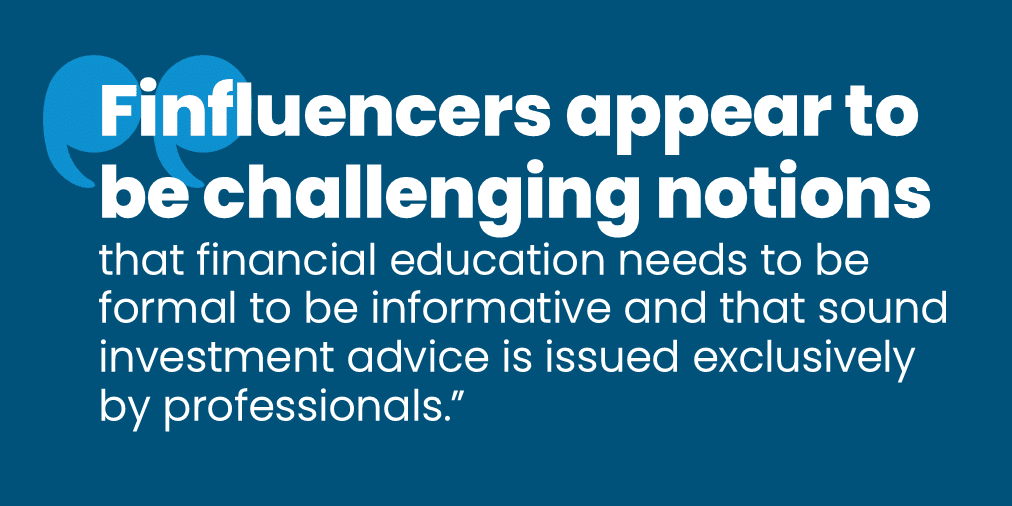
Finfluencers are on the rise—and industry groups and regulators are paying attention
Finfluencer: A social media influencer who provides personal finance education or advice to followers.
For many years, my idea of a finfluencer was one of the many well-followed financial thought leaders who were widely quoted in the media and on social media—people such as Michael Kitces, Wade Pfau and Christine Benz who are well known by professionals at asset management and financial advisory firms.
But today, that term means something very different. There is an army of social media influencers, many of them sponsored, whose reach is broader and yet their qualifications are less established. These finfluencers, recent cases suggest, create challenges for financial marketers and communicators.
In a recent comprehensive report “Finfluencer Appeal: Investing in the Age of Social Media,” the CFA Institute Research & Policy Center explores the explosion of influencers and what it means for both financial firms and social media platforms.
For the younger social media savvy generation, finfluencers are in effect online intermediaries who are talking to them, providing general investment education, offering guidance and sometimes even investment recommendations. Their content is mostly on YouTube, TikTok and Instagram and can receive high levels of engagement.
Research by the FINRA Investor Education Foundation and the CFA Institute found that 60% of investors aged 18-34 use social media to source investment information and 37% of Gen Z investors cite social media influencers as a major factor in their investment decision making. It is no surprise, then, that financial communicators and digital marketers believe finfluencers could potentially be useful to reach Gen Z audiences.
Interestingly, the generation most likely to be influenced by finfluencers may be so due to insufficient exposure to financial education, limited access to financial professionals and a strong preference for getting their information online.
Overall, finfluencers appear to be challenging notions that financial education needs to be formal to be informative and that sound investment advice is issued exclusively by professionals.”
The CFA Institute notes, “Our research suggests that finfluencers may be filling the gap in access to financial information by helping synthesize what is perceived to be complex financial information into accessible social media content. Overall, finfluencers appear to be challenging notions that financial education needs to be formal to be informative and that sound investment advice is issued exclusively by professionals.” (We heard the same when we interviewed our Gen Z interns last summer.)
A major problem, according to the CFA report: only a small portion of that finfluencer content includes any disclosure about the professional status of the poster or whether they receive any compensation for their posts.
Regulatory risks of engaging finfluencers
Regulators have begun to pay attention, given the growing influence of finfluencers and as some financial marketers allocate budget to these audiences.
Consider several recent SEC settlements:
- VanEck paid $1.75 million to settle allegations that it had failed to disclose its relationship with influencer Dave Portnoy of Barstool Sports. Portnoy was paid to promote the VanEck Social Sentiment ETF (BUZZ), receiving compensation on a sliding scale based on how successful the ETF was at attracting investments.
- Kim Kardashian settled with the SEC on charges of touting a crypto asset security on social media without disclosing she received payment for the promotion.
- Fundrise Advisors was fined by the SEC for making cash payments to certain social media influencers to solicit clients for the firm.
In each of these cases, the SEC seemed mainly focused on the fact that the agreements with finfluencers were not disclosed.
The CFA Institute encouraged regulators to work together to implement a universal definition of what constitutes an “investment recommendation.”
The CFA Institute believes regulators play a role and made recommendations for how they can help. Given the risks to consumers of both potentially harmful advice, conflicts of interest, misinformation and potential scams, the CFA Institute encouraged regulators to work together to implement a universal definition of what constitutes an “investment recommendation.” It also recommends that regulators publicly report on complaints about finfluencers.
The social media platforms have a role to play too. The Institute encourages them to moderate content, publish guidelines and have procedures to remove harmful content.
Moving forward
Marketers who have spent any time in the financial industry are well aware of basic concepts like full and complete disclosure, avoidance of conflict of interest and avoiding any language that might be misleading. They work hard to maintain relationships with compliance partners and seek to avoid ever putting their firms at regulatory risk.
While the CFA Institute offers several high-level recommendations for the industry, we’d like to offer some commonsense advice to financial marketers as well:
- Before engaging with a finfluencer, do your due diligence. Do they offer practical and useful advice? Do they have experience or credentials to offer that advice? Are there signs that the influencer’s audience is benefiting from that advice?
- If you find a finfluencer who is reaching your audience, consider traditional advertising or sponsorship versus any kind of compensation tied to referrals or asset growth.
- Be cognizant of reputation. When entering into an engagement with an influencer, their reputation, good or bad, could rub off on your firm. Do you really want to be answering client questions about their scandals, financial malfeasances or criminal behavior?
- Fully disclose any paid relationships. And make sure that any finfluencer partner fully discloses your relationship including all necessary compliance disclosures.
Subscribe.
Receive the latest news and insights from Lowe Group.